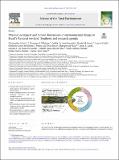Files in this item
Physical, ecological and human dimensions of environmental change in Brazil's Pantanal wetland : synthesis and research agenda
Item metadata
| dc.contributor.author | Schulz, Christopher | |
| dc.contributor.author | Whitney, Bronwen S. | |
| dc.contributor.author | Rossetto, Onélia Carmem | |
| dc.contributor.author | Neves, Danilo M. | |
| dc.contributor.author | Crabb, Lauren | |
| dc.contributor.author | de Oliveira, Emiliano Castro | |
| dc.contributor.author | Lima, Pedro Luiz Terra | |
| dc.contributor.author | Afzal, Muhammad | |
| dc.contributor.author | Laing, Anna F. | |
| dc.contributor.author | Cordeiro de Souza Fernandes, Luciana | |
| dc.contributor.author | da Silva, Charlei Aparecido | |
| dc.contributor.author | Steinke, Valdir Adilson | |
| dc.contributor.author | Steinke, Ercília Torres | |
| dc.contributor.author | Saito, Carlos Hiroo | |
| dc.date.accessioned | 2023-01-12T11:30:29Z | |
| dc.date.available | 2023-01-12T11:30:29Z | |
| dc.date.issued | 2019-10-15 | |
| dc.identifier | 277619869 | |
| dc.identifier | 91712e75-c9ed-44c5-a59c-d8c62bad567a | |
| dc.identifier | 85067482657 | |
| dc.identifier.citation | Schulz , C , Whitney , B S , Rossetto , O C , Neves , D M , Crabb , L , de Oliveira , E C , Lima , P L T , Afzal , M , Laing , A F , Cordeiro de Souza Fernandes , L , da Silva , C A , Steinke , V A , Steinke , E T & Saito , C H 2019 , ' Physical, ecological and human dimensions of environmental change in Brazil's Pantanal wetland : synthesis and research agenda ' , Science of the Total Environment , vol. 687 , pp. 1011-1027 . https://doi.org/10.1016/j.scitotenv.2019.06.023 | en |
| dc.identifier.issn | 0048-9697 | |
| dc.identifier.uri | https://hdl.handle.net/10023/26746 | |
| dc.description | This article was conceived at a Newton Fund Researcher Links Workshop “Climate and Landscape Change in the Pantanal: assessing environmental vulnerabilities and future water security in Brazil's wetland wilderness”. The authors would like to thank Philip Stickler for kindly producing Fig. 1 for this article. Funding from Northumbria University for open access to this article is gratefully acknowledged. | en |
| dc.description.abstract | The Pantanal is the world's largest freshwater wetland, located in the geographical centre of South America. It is relatively well conserved, and features unique landscapes, ecosystems, and traditional cultural practices, shaped by the dynamic interaction of climatological, hydrological, geological, ecological, and anthropogenic factors. Its ecological integrity is increasingly threatened by human activities, particularly, in the wider catchment area, for example, deforestation, agricultural intensification, and construction of hydropower plants, with implications for local people's livelihoods. We present a synthesis of current literature on physical, ecological, and human dimensions of environmental change in the wetland, outline key research gaps, and discuss environmental management implications. The literature review suggests that better integration of insights from multiple disciplines is needed and that environmental management could be improved through a better grounding in traditional practices and local perspectives. We conclude with four recommendations: First, future environmental change research should build more strongly on the positive example of a small number of case studies where traditional and local knowledge of the environment was put into a dialogue with scientific knowledge and techniques. Second, we recommend a more explicit consideration of longer temporal scales (>10 years) in environmental change research, making use of oral and written histories, as well as palaeoecological techniques, to understand system responses to different magnitudes of human and climatic pressures, and ultimately, to inform future adaptation activities. Third, we suggest that enhanced stakeholder participation in conceiving and implementing research projects in the Pantanal would strengthen the practical relevance of research in addressing environmental management challenges, livelihood needs, and advocacy processes. Fourth, we call for a more systemic and integrative perspective on environmental education, which encompasses engagement activities between researchers, policy-makers, and citizens, to foster environmental awareness, scientific literacy, and public participation. | |
| dc.format.extent | 1779962 | |
| dc.language.iso | eng | |
| dc.relation.ispartof | Science of the Total Environment | en |
| dc.subject | Environmental change | en |
| dc.subject | Climate-landscape dynamics | en |
| dc.subject | Environmental education | en |
| dc.subject | Pantanal | en |
| dc.subject | Brazil | en |
| dc.subject | GE Environmental Sciences | en |
| dc.subject | SDG 4 - Quality Education | en |
| dc.subject | SDG 13 - Climate Action | en |
| dc.subject | SDG 15 - Life on Land | en |
| dc.subject | MCP | en |
| dc.subject.lcc | GE | en |
| dc.title | Physical, ecological and human dimensions of environmental change in Brazil's Pantanal wetland : synthesis and research agenda | en |
| dc.type | Journal item | en |
| dc.contributor.institution | University of St Andrews. School of Geography & Sustainable Development | en |
| dc.identifier.doi | https://doi.org/10.1016/j.scitotenv.2019.06.023 | |
| dc.description.status | Peer reviewed | en |
This item appears in the following Collection(s)
Items in the St Andrews Research Repository are protected by copyright, with all rights reserved, unless otherwise indicated.

